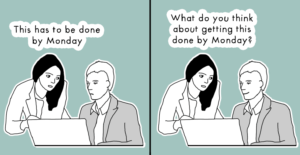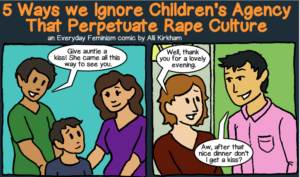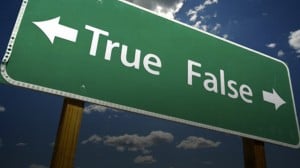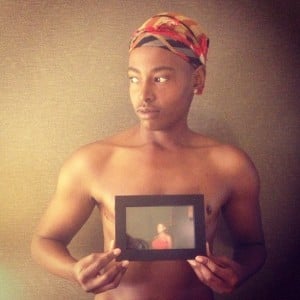
Source: Gallery Hip
One person alone can incite a wave of change. But for that change to happen — and if it is to be a permanent change, and not a temporary, riled up shift — it takes a village.
It takes more than the one who is calling for change, but the active participation of a community of allies — those who notice, recognize, and acknowledge the urgent need for change — to rise up collectively and facilitate that change.
Rising up is often about speaking out (or physically confronting) in order to tear down a structure that represents a harmful part of a group of people’s lives. Media, for example, has long used its influence to perpetuate harmful stereotypes and toxic messages about women and all people of color.
The uprisings against this ongoing slander have included protests, boycotts, and alternative media creations of documentaries, books, and websites dedicated to repairing or countering media’s adverse effects on how groups of people are perceived and subsequently treated.
Black women in particular are misrepresented by media through a very narrow and often negative lens.
There is a barrage of toxic messages hurled at Black women by media, ranging from objectification, to vilification, to grossly narrowed social representations, to racist beauty standards — and this is by no means an exhaustive list.
The other thing about rising up is that it can also be less about tearing down what doesn’t serve a people and more about creating and sharing what a group of people need and love.
Uprisings can be about building confidence despite the constant messages to the contrary. Indeed, being a woman of color can be a contrary experience for a woman inclined toward confidence.
Women like me, Black in (White Male) America, are painfully aware of how the toxic media messages — and the society those messages represent — affect how we are viewed and whether we are valued.
These effects don’t just play out on TV or in magazines, either. They show up in our own interpersonal relationships and in our perceptions of ourselves.
As we maneuver this space, and as our allies trickle in to ask how they can help, I seek to contribute to the uprising by proposing five solutions to the toxic media messages that can rob us of self-love and self-expression.
1. Take the Power Out of Media’s Hands
It’s important to hold others accountable for their actions and to say how we feel about the ways in which things are done.
Ultimately though, we cannot control the behaviors of others. We can only seek to influence their decisions.
We can, however, make a practice of empowering our own selves by taking greater ownership of our stories.
If we want to be honored, valued, and treated fairly, we must focus on solutions at least as much as we focus on the problems.
The problems are known and named. And once they are named, we have a responsibility to demand our needs and work together to create the realities in which we believe we can thrive.
What have you done to contribute to alternative narratives of women of color?
Recognize and honor the truth that you may not be the one to incite the change, but you can be part of the collective voice that demands and creates it.
Write your own stories. Support media that represents you in a more positive light. Join grassroots organizations that are on the ground, in the communities, being the change they seek.
2. Be Willing to Be Our Own Example
According to media, positivity doesn’t sell, and it doesn’t even ring true in the minds of most of the decision-makers and “relevant” consumers.
Even the existing channels created for Black people are miles away from helping create a balance in the types of portrayals of Black women in America. It’s crucial that each of us are willing to be our own examples of the types of Black women we want to see more of.
There is a widely used adage that says “You can’t be what you can’t see,” but I am not of the belief that we need to attribute a feeling or accomplishment to a person in order to start believing in it. Yes, seeing the example makes it easier to believe it as an option, but it is not the only way.
It’s also important to consider the incredible opportunity of paving our own paths, so that those who come after us have examples of what they can be.
I recognize that this option is not for all of us.
There are, however, many Black women who have been their own examples, or, like me, have created an idea of a life based on bits and pieces of things we read, desire, and crave.
As it relates to media messages and how contrary they can be to what we know and desire, one way to be our own example is to use our feelings as a barometer.
It is possible to know intuitively how you want to be treated, and you can look at how you feel when you interact with certain mediums to gauge whether that medium represents you in a way that you appreciate.
If you don’t like the message, change the channel or close the magazine, and start listening inward.
To access that feeling barometer, utilize self-inquiry practices such as asking yourself “What do I need in order to have more positive experiences with the types of media I consume?” and “What can I do to bring that representation to light somewhere today?”
3. Honor Your Personal Why
This might come as a surprise to some, but so many Black women are done with the notion of being the learning channel for White people in their circles.
Those of us writing in spaces like these (where we do not represent the majority) are aware that there are far fewer of us, and far more people who want to learn more about our issues and how they can be part of the change.
When I wrote a piece last month about Black girl natural hair, for example, I was surprised by the amount of comments that showed how little White people know about some of the issues that Black women face daily.
But my sole purpose for writing these types of articles is less about educating people of privilege and instead about contributing to the narratives that give voice to marginalized groups and muted issues.
This conversation is being had among us Black women writers, and many of us are past the point of wanting to prove that our issues are relevant.
Instead, our personal whys are as diverse and multifaceted as our perspectives, and we write in efforts to be the change by adding our voices to the countless media spaces where we are either represented by a tokenized version of our group or we are not considered in the dialogue at all.
For example, “nude” as a shade for make-up, underwear, and now nail polish rarely include the hues of black women. The very light-skinned among us could get away with some of the shades, but the deep, rich, varying shades of brown were nonexistent until very recently.
If this seems trivial to you, consider your lens.
These new discoveries of our needs are part of my own personal why as a writer who addresses racism and sexism in America today.
My uprising takes the form of personal narrative and reasoned discourse in the direction of my people — not to change the minds of the privileged, but to give voice to the stories of the often ignored and grossly misrepresented group to which I belong.
4. Discern Between Your Own Voice and the Harmful Messages
So many of us run away from our own thoughts, when sometimes, the messages in place of our thoughts are far more harmful.
In order to start differentiating your own voice and feelings from the messages that are shoved down your throat through media, you have to consume responsibly.
Media literacy is a practice of mindful consumption of all media. For a simple explanation and a few ways to begin your practice, check out our editor, Melissa A. Fabello’s, Media Literacy 101 video.
One important aspect of media literacy is the defining of media itself.
Though we may tend to see media as larger networks and major magazines, know that media is far more than that today. If you blog, you hold a media pass. And when you comment on other blogs – or even on Twitter – for example, you are contributing to media messages.
It’s probably easier for your voice to be heard on a blog than on Fox News, for example. Use your own platforms to speak your piece. If you are a Black woman and a writer, don’t shy away from writing in spaces where you may be one of few people of color.
Mindful consumption of media is about more than what to watch or what not to read.
This practice helps us realize that a lot of what we think we believe is merely information we haven’t processed for ourselves.
We see the messages about needing to be a certain size, needing to be in a certain type of relationship, having certain priorities, or looking a certain way, often just as placeholders — placeholders that we can now revisit and decide whether that particular assertion connects with who we are and how we want to feel.
5. Speak Out to Destroy and Rise Up to Build Anew
If we ourselves know who we are, we can speak up in confidence — not to convince, correct, or even educate any other groups about who we are or who we are not.
Instead, we do this to look in our mirrors and be able to say, in complete honesty, that we know and respect who we are, and we walk, talk, dress, and live and love in ways with which we are comfortable and proud.
I choose to focus on the uprising that is about building and supporting what I, and women like me, need. I believe in naming our pain and pointing out our oppressors and in willingness to reform and smash media structures that do us wrong.
But while we name, point, and smash, we will still need to create a foundation for the new structure, for the reform.
In doing so, our girls and our women will not be conflicted and angered by the stark difference between the women they know in real life and the women on TV and in magazines, who media claims represents all Black women.
That foundation, that reform, is the genesis of a new norm, where women of color use collective positive action toward ownership of our own stories, through our own channels, and finally, in our own varied voices.
[do_widget id=”text-101″]
Akilah S. Richards is a Contributing Writer for Everyday Feminism. She is a six-time author, digital content writer, and lifestyle coach who writes passionately about self-expression, womanhood, modern feminism, location independence and the unschooling lifestyle. Connect with Akilah on Instagram, Tumblr, or her #radicalselfie e-home, radicalselfie.com. Read her articles.
Search our 3000+ articles!
Read our articles about:
Our online racial justice training
Used by hundreds of universities, non-profits, and businesses.
Click to learn more




















